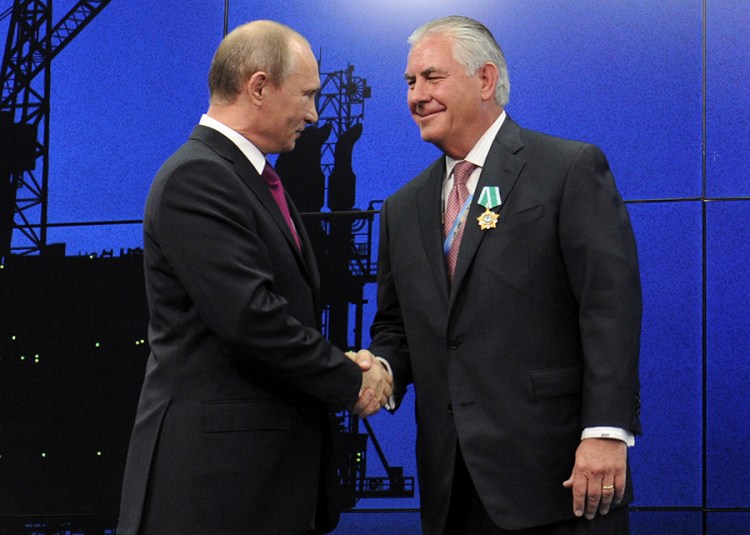MOSCOW — They’re resetting expectations in Russia for a reboot of relations with the United States.
It wasn’t that long ago that Russia’s establishment was reveling in President-elect Donald Trump’s victory. That enthusiasm has cooled drastically over the steady drumbeat of bad news coming from Washington.
There was Trump’s acknowledgment of the intelligence community’s conclusion that Russia was responsible for hacking the Democratic Party during last year’s election. That followed lurid reports that Russian security agencies had compromising material on the president-elect, which came after new sanctions by the Obama administration.
Moscow dismissed it all, but then came the tough talk aimed at Russia by Trump’s nominees for defense secretary and CIA chief at confirmation hearings last week, who both referred to Russia as a threat in remarks that clashed with the president-elect’s call for cooperation with Russia on a number of fronts.
Now the euphoria has faded to a kind of somber acceptance.
“Russia wants to lower expectations on the future relations with the U.S. because it is afraid of being disappointed,” said Alexei Makarkin, vice president of the Center for Political Technologies, a Moscow think thank.
Makarkin said that some in Moscow are imagining something similar to the U.S.-Soviet detente in the mid-1970s, when the two nuclear superpowers tried to make deals against the backdrop of Cold War competition. That’s quite a comedown, but it reflects the words of Marine Gen. James Mattis, Trump’s nominee to be defense secretary, who told the Senate Armed Services Committee that Russia is one of the nation’s top threats, and that Russian President Vladimir Putin “is trying to break the North Atlantic alliance.”
Mike Pompeo, Trump’s choice to lead the CIA, decried Russia as “threatening Europe” and “doing nothing” to defeat the Islamic State in Syria.
Cold War fighting words, and music to the ears of those in Congress who see Russia as an enemy.
Putin and his spokesman have consistently expressed hope for better relations but have also cautioned about “excessive optimism.” Now, this wait-and-see stance may be self-defeating, said Pavel K. Baev, an analyst at the Peace Research Institute Oslo.
“The Kremlin has good reasons to worry that the combination of two scandals – on the hacking and on the dossier – has pushed Trump into an ugly corner,” Baev said. “He may conclude that since it is so hard to block the anti-Russia drive, it is far easier to take a lead on it. Makes perfect political sense, and one thing Trump is good at is making turnarounds.”
Baev suggested that some Putin advisers may argue in favor of allowing Trump a quick and impressive victory with Moscow, “instead of leaving him to explore options for going strong against Russia.”
The question is what sort of victory?
Russia has signaled its intention for improved ties by inviting the Trump administration to joint Syrian peace talks it is sponsoring later this month with Turkey and Iran, part of a process from which the Obama administration pointedly has been excluded.
But is that enough? Not if the peace process collapses.
A bigger prize might be if Moscow helped pressure North Korea to curtail its efforts to develop missiles that could reach the United States, something Trump has said “won’t happen.” But that’s no slam dunk: Moscow has had better relations with Pyongyang than most, but it hasn’t been able to stop North Korea so far.
The main problem is that Russia probably needs more from the United States than Washington needs from Moscow. The big one is the lifting of sanctions over Russia’s annexation of Crimea and its proxy war in eastern Ukraine, which the Obama administration has extended into 2018 and which restrict Russian access to Western investment and lending markets.
“The issue of sanctions is probably the key for the elite of Putin’s circle and his ability to move in the right direction on the way towards removing sanctions is extremely important now for him and for the elite,” said Kirill Rogov, an analyst for the Gaidar Institute for Economic Policy in Moscow. But Rex Tillerson, whose nomination to be secretary of state caused the most optimism in Moscow among Trump’s appointments, suggested this was not the time to lift sanctions.
Frants Klintsevich, who heads the defense and security committee of Russia’s upper house of parliament, summed up Moscow’s new expectations for the bilateral relationship in comments to the Interfax news agency.
“Russia doesn’t expect any favors from the 45th U.S. president,” he said. “This is a process that will go step by step even in the best-case scenario.”
Send questions/comments to the editors.


